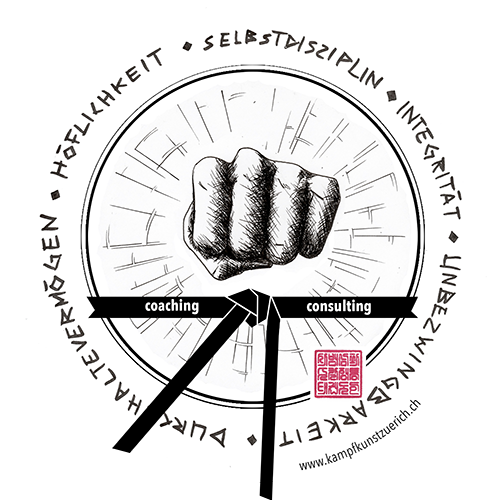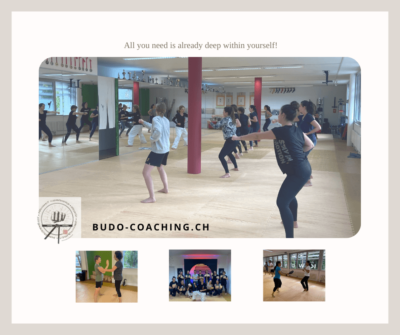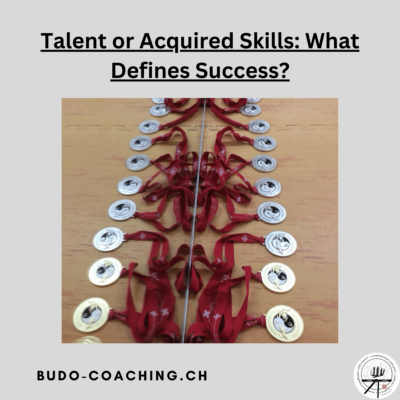Open up to your world of possibilities Do you find yourself constantly worrying about what…

Martial arts as school for life
4 reasons why I love to be on the martial arts’ path
I enjoy working with people: as a teacher, consultant, in personnel functions or as a coach. I like to get to know different people, cultures and new places. I studied foreign languages and literature – can it be that my empathic streak comes from there, as this interesting article explains? (https://ideas-ted-com.cdn.ampproject.org/c/s/ideas.ted.com/how-literature-yes-literature-can-help-you-better-connect-with-others/amp /)
# 1 As a guide
Why I started martial arts in my late twenties is easy to answer: it completed my life and initially fulfilled the desire to stay healthy through good physical and mental training.
The answer to what I do for a living used to be a lot easier too. There were names like Human Resources Manager or Consultant and most of them could deal with that straight away. But budo coach?
Over the years of practice, I’ve come to understand that the martial arts are much more than just physical fitness and cool self-defense techniques.
For me personally, the Korean martial arts have become a guide and meanwhile even an instrument to implement coaching programs for people who want to address their issues from a completely different perspective. And through physical effort.
# 2 As lifelong learning
Martial arts taught me to be aware of my surroundings and myself. Martial arts taught me to let go of old burdens and accept defeats. To get up again, to carry on, to listen to my intuition. Always trying to be at my best for myself and my fellow human beings.
In martial arts I have found inspiration and a path of lifelong learning.
That takes me and my coachees further.
# 3 As the path of personal freedom
People want to get ahead in life and at work.
This happens along with developing your own personality and your own resources. We grow thanks to our ability to learn. Thereby we change ourselves and our situation.
Still, being the best in your job always relates to the quality of others; it is compared, assessed and judged. This often maneuvers people into a dead-end and the comparison has a limiting effect: someone out there will be always richer, more successful, more powerful, smarter.
In martial arts, instead, you compare yourself to yourself: your own growth is the only yardstick.
Performance values such as function, income and status lose importance on the training mat.
You learn to set self-development goals, no matter what the others are doing. And that makes you free of judgement and only committed to what you promised yourself.
Martial arts systems are clear, straightforward, give you a framework, direction and at the same time freedom to go your own way.
It’s about the journey, not the arrival. In this way you learn that the stages that you experience along the way will enrich your life and expand your possibilities.
The career ladder in the working environment is vertical; In martial arts the journey is more like a spiral – it never ends.
You learn to never sit back, take responsibility for yourself, and get better. Within, focused on yourself, at your own pace, with your possibilities.
# 4 As a coaching tool
Employee development is my heart and soul. Pushing people to get the best out of them and to recognize what they can and want, so that job and person are a match.
There are no bad employees: there are employees who are in the wrong place. There are also people who do not trust themselves, who sabotage themselves and who pay too little attention to their inner voice.
There are people, even very successful people, who sometimes just “work”: They perform at the highest level, bring excellent results, but are not necessarily fulfilled as a result.
How often have I seen in the course of company restructuring how executives have to leave their jobs from one day to the next. Some fall very hard.
Especially those who confuse themselves with their professional position. Suddenly they don’t feel worthy anymore.
No one can tell what people want from life and at work, except from themselves. Budo coaching helps to find the answer. In this way, we support people to believe in themselves, not to waste their potential, not to give up and to pay attention to their own health and inner voice.
The value system, the principles, the techniques of martial arts serve as a school of life, can be transferred to everyday life and lead to reflection.
They change the way you look at situations. They bring about a different understanding.
Martial arts teach you to react differently to things that just happen in life and to look at them with different eyes.
It is nice to see how budo coaching gives people new energy; or to experience teams that get closer and learn to appreciate one another. But I am particularly proud of those, mostly women, who gain security realising their strengths and value.
Do not do more, do different!
I have often observed this mistake in companies and made it myself: if something went wrong in a project, many responded by doubling the effort, working overtime, trying to do more of the same thing as before. Others gave up, moaned and did even less.
In return, the greater impact came from those who broke through the old ways and tackled the problem differently. Challanging the status quo.
Doing and trying new things enables new things to be experienced. Sure, that doesn’t protect against failure, disappointment, or new mistakes – but these in turn offer new insights, new knowledge and experiences.
CONCLUSION
Martial arts bring development; development brings change and change creates new growth opportunities.
Everyone is looking for fulfillment. Quite individually, depending on the situation and phase of life, the desire for social recognition, the desire to be loved, the desire for emotional and material security spread. (Read more hier)
How do you fulfill these wishes? How to get there? What does fulfillment or success mean? The answer is actually within us.
To get further, to change, to find orientation, however, require the willingness to deal with it. It is not always easy: Some people just feel sorry for themselves. Whine. Others question and dare to dig deeper within themselves. And act.



